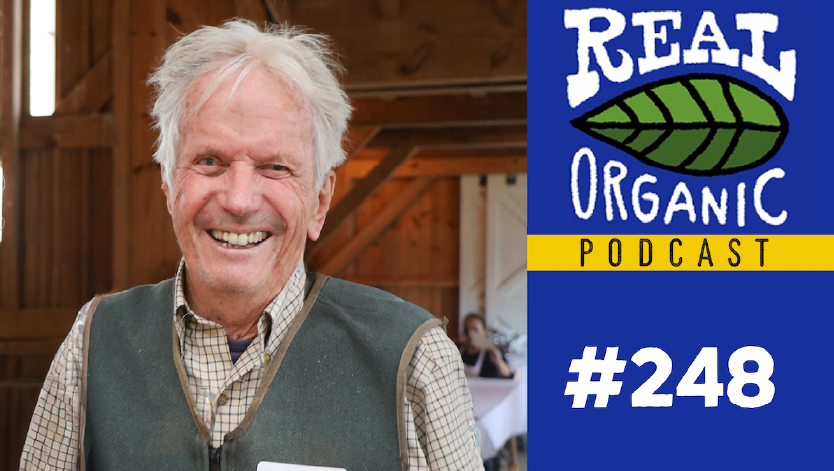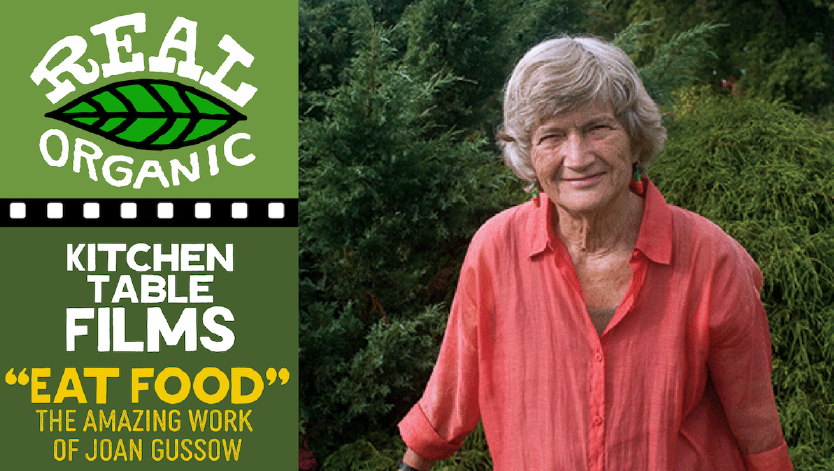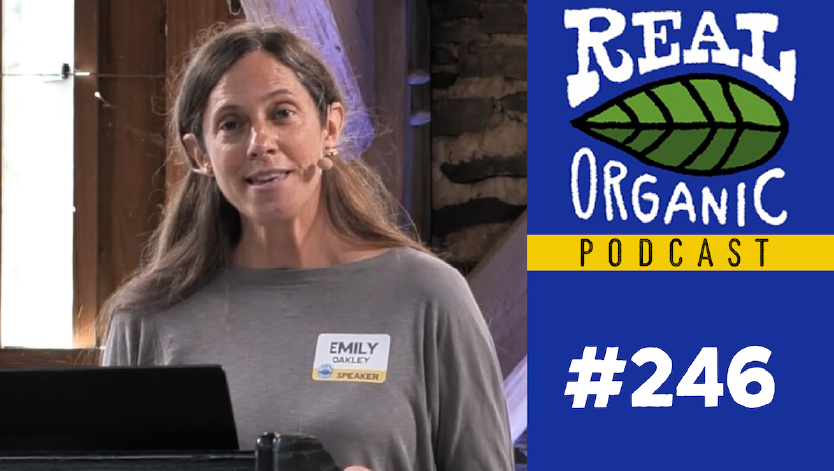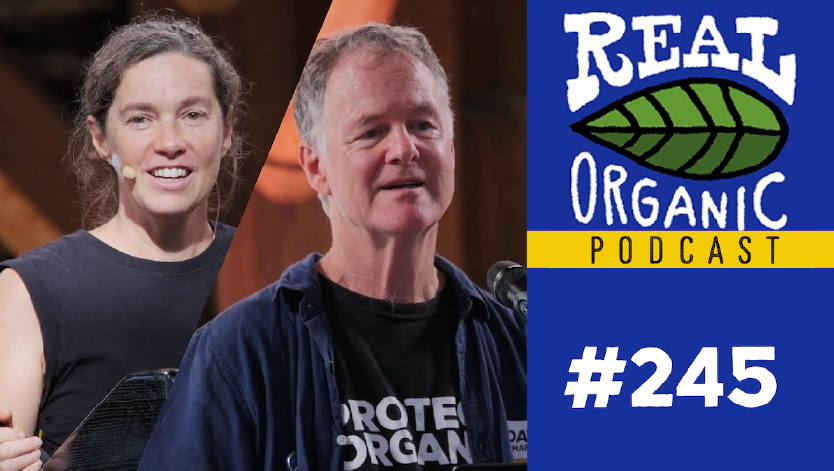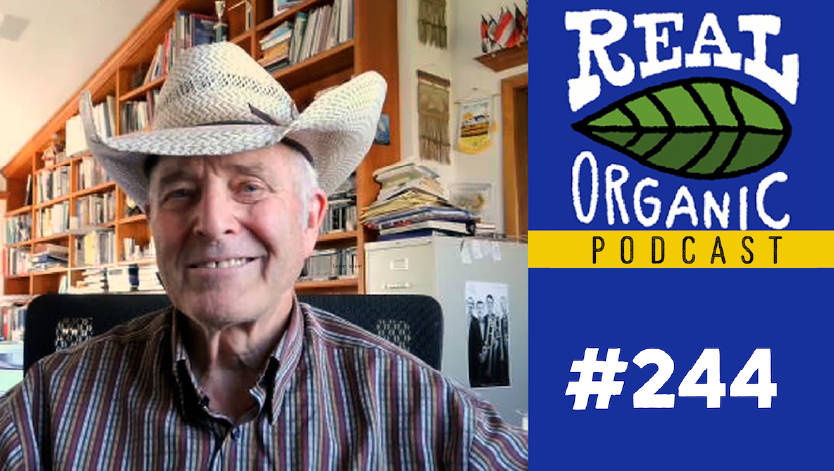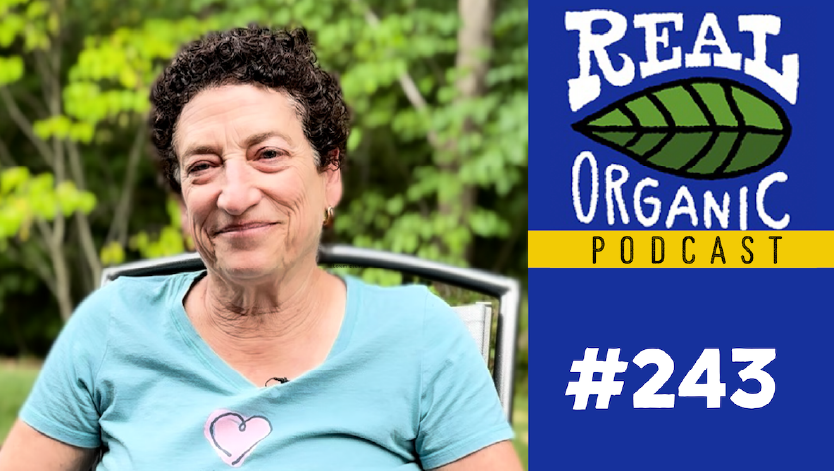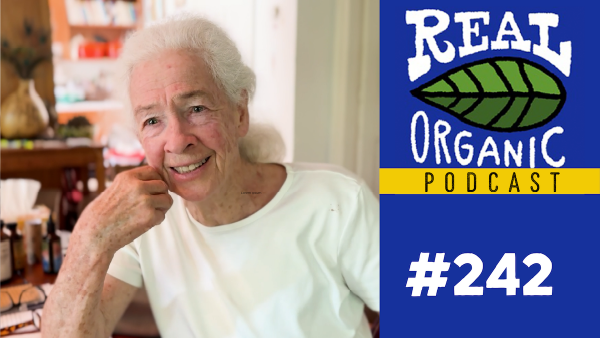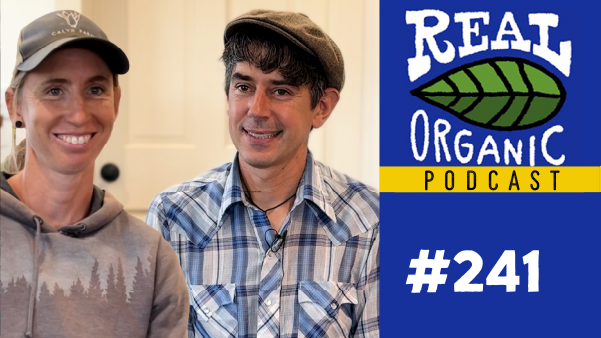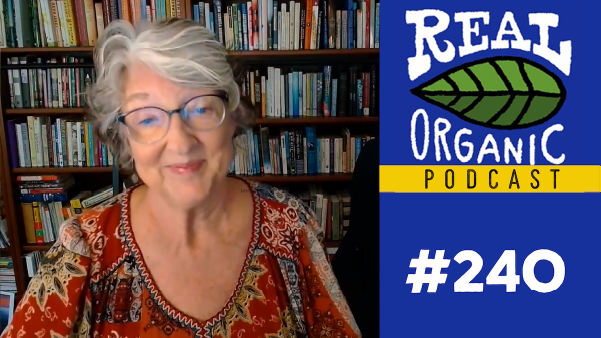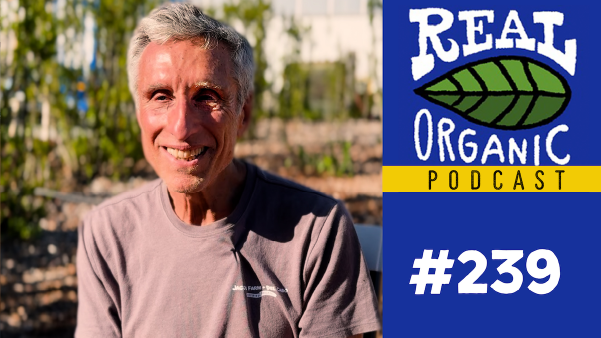Episode #195
Anthony Suau: The Making Of Organic Rising
Welcome! You can subscribe and download episodes of our show through your favorite podcast app.
You can also subscribe to receive the video version of each episode on our YouTube channel.
Our Anthony Suau interview has been edited and condensed for clarity:
Dave Chapman interviews Anthony Suau in Vermont, Summer 2024:
Dave Chapman 0:00
Welcome to The Real Organic Podcast. I’m talking today with Anthony Suau. Anthony, so glad you’re here. So you made Organic Rising a labor of love for how many years? 12 years?
Dave Chapman 0:18
12 years you worked on this? What began this movie. Why did you, why did you take this project on?
Anthony Suau 0:28
I had lived in Europe for about 15 years, and I moved back to the states in 2008 and immediately started gaining weight, getting sick frequently. I was eating the same foods that I had eaten when I was a kid. And I grew up in Peoria, Illinois, and but it was having something was wrong. Something was having a really difficult, tough effect on me physically. And then I saw Food Inc, the film, it happened to come out about that same time, and, you know, it opened my eyes to what was going on. There was something going on in the food system, or something going on in the food that I was buying. And we started, I started to hear about this thing called organic, and I had no idea what that meant zero. And so I was actually working in California on a for Time Magazine, on a story on the mortgage crisis. Around that time, that’s when the mortgage rate, and I ran into a woman who had a small organic farm, and I said, Well, I’d like to come out and try to make a film to help people understand what that means. Because I don’t understand what it means. I think that it would be a very helpful thing. I thought it would make a 10 or 15 minute film. And next thing I knew, I was meeting people like Jeff Larkey and Tom bros out in out in Santa Cruz and and all these amazing farmers and getting access. And they were just wonderful people and very inspiring. And in 2014 maybe a year into the production, we did an Indiegogo campaign, it just went crazy. I mean, we just had so many people that were interested in the topic. We immediately raised the funds. But we also had so many interesting people coming at us and wanted, wanted to be part of the film and want to support the film in other ways, people like Aaron Stevens at Nature’s path, and David Broner. And of course, of course, Maria Rodale at that point came in, and she was very supportive of the project. And so, and then, and then Elizabeth Kucinich came in it, and it just kind of exploded into this thing where all of a sudden, I just didn’t have access to smaller farmers in one region. All of a sudden the big producers were coming at me, and all these doors were opening, and it just had to be a feature length film, and we spent the better part of the next three or four years doing over 100 interviews with people in the organic community across the country in various aspects, and initially we edited it down to a 10 hour series where we really went into a lot of different aspects that unfortunately are not represented in the film. We had to edit it down, and I began working with a big producer, uh, production company, Goldcrest films. They picked it up immediately. They thought it was a great topic, and they took it to Netflix at 10 hour 10 hour series. This is before covid, before Netflix was Netflix. It was just Netflix, and they didn’t know what to do with it. They didn’t know it wasn’t something they initiated. It was half done. It was it was not completed. And so the producer said, let’s, let’s cut it into a future film. Let’s give them something they can that we can sell. We know how to we know how to market, and that they’ll know what that product is. So that’s what we did. We spent the next finish polishing off all the production and then going into post production for a number of years, and we finally released it last year, at late last year, yeah.
Dave Chapman 4:26
So one question I first have to ask is, did your health change as you did you change your diet immediately? Yeah, yeah, overnight. So when you started to eat organic food, all of a sudden, these problems that you were having disappeared entirely. So entirely you came into this suspecting something was going on, yes.
Anthony Suau 4:47
Well, something was going on. Something was going Yeah, no doubt. Yeah, there was no doubt. And yeah, once the diet was changed. I mean, my interest. In continuing the film, and my passion for it was really, I think, twofold. First, it was as a consumer, I understood that I could make something to explain to other consumers what it is that this organic community was doing, and because it and secondly, these people were so inspiring to me, to meet them and to have conversations with them and seeing their operations and what they were doing. The integrity that was involved with it, within the people within that community, was something that you know, you had, you had to be part of that you had, you know, the passion that I had came from the passion that they had, really and it was just a reflection. Because for me, that there was some, there was so much inspirational aspects to it, and so many inspirational people and farmers across this country that were getting no recognition for what they were doing, and I was seeing the press was not covering this in any way. There was no one telling the consumer what was the NOSB, what was Omri? What? What? What are the different factors that play into the food that we’re feeding our bodies and and our and determining our health and so all of that inspired me to continue almost throwing any caution to the wind. I’ve got to get this done. This is so important. In the meantime, people like you and other people throughout the industry kept hammering on this idea every time the consumer is confused, the consumer is confused. We need more consumer understanding. And I remember in post production, thinking to myself, almost answering people like you back through the internet, saying, I’m working on it, I’m working on it. It’s coming. It’s coming, you know? And that was really the intent, was to try and help the consumer who walks into Whole Foods, who walks into a co op and sees that USDA organic label, or sees the real organic label and understand what is behind that, and the process behind that, and what it is they’re buying. Because, as the film went on over, over that period, that decade or so, it became, my sense was that consumers became more and more confused, and part of it was big industry wanted to confuse them. You could see it very clearly what was what was taking place. And you know, the Washington Post would do a lot of stories that were always negative about organic, you know. And no one was doing anything that at all that was really promoting organic. I think Michael Pollan, when he wrote the book Omnivores Dilemma, dilemma, you know, he wrote about Joe sullaton, and that became, he became an icon of the industry, and that’s about when I came into it myself, so but he was the only thing that was being shown out there in the real world that consumers could have an idea of what that meant, the word organic. And he was a great role model for that role. And I filmed a number of young farmers, and we’re doing the Joe sullaton way, you know, we’re doing that that he did, you know, so he had a huge influence all across the country, and it was a very positive influence. But I have at my sense was in working on the film that there were so many Joe sullatons out there, all across the country that were doing incredible things, and they needed not only to I needed not only to show them for what they were, but for the public to understand what they were doing and what that meant when they went to pick up that food in the in the supermarket, and you walk into a supermarket, as you said earlier, it’s so confusing for any consumer, even me, after 12 years of working on this film and meeting so many people, having pretty clear understanding what that label represents. As you said, there is very little produce that you actually in a supermarket should be buying and some some supermarkets almost nothing there sometimes. But you have to understand what is going on behind that process to really appreciate what it is that you’re paying a little bit more for and how that’s going to affect you and your health. And your family’s health and your children’s health and and that’s, that’s was the drive for the for the film,
Dave Chapman 10:10
That’s great. So much, so much of the stories that are told are negative. And, of course, the the core message of organic is so immensely positive. I mean, it’s, it’s not a protest march around the Tiktok bread factory. It’s creating alternative to that.
Anthony Suau 10:33
Yes, and I the one thing that happened when we had the Indiegogo campaign in 2014 where we reached out to for crowdfunding, and we got it was that one person, I have no idea who it was, said to me, listen. How can you explain organics without explaining what organics is not and you should go and talk to the scientists that are reviewing the pesticides that are being used in conventional agriculture that are not allowed in organic to really unders, to let the audience really understand what organic is not and and I thought that was the most brilliant idea. I just love that. And I ran with that idea. And I was researching this out. And there was a journalist in my home city, Peoria, Illinois, by the name of Claire Howard, who was doing all this brilliant journalism on the effects of Atrazine and the effects of glyphosate and two 4d and dicamba. And she was working for the newspaper I grew up with, which was the Peoria Journal Star. And she ended up getting fired because of her reporting on the human effects of Atrazine. And she was testifying there was a court case in the Midwest at least a decade ago with where Tyrone Hayes, the scientist, came in, and he testified about what Atrazine was doing to his frogs, and she was there as well. And these companies, Syngenta, who was marketing this chemical, was being sued because this chemical was ending up in the water supply of everyone in the Midwest, and so these water companies sued them to remove the Atrazine from the water before it was delivered to the customers. And of course, the water companies won. There wasn’t any question. But anyway, I somehow got in contact with Claire Howard. Turns out I had been at her house for a party maybe four or five years ago, and I didn’t even make the connection. So she knew all of these guys. She said, You need to talk to Tyrone Hayes, you need to talk to Warren Porter, you need to talk to Paul Winchester and Don Huber. And I did, and it was, it really turned out. Then we went out, we we interviewed Michael Skinner at Washington State. And I think that aspect of the film, when I started doing those interviews in 2014 is when I knew I had, this was a bomb. This was a ticking bomb. This was I first thought that these guys were crazy. I the information coming through these interviews was so intense I couldn’t understand why this information was not being reported in any media. I had worked for Time magazine. I had worked for National Geographic. I’d worked for the New York Times Magazine. I worked for all of these publications for decades prior to doing this film. And how could it be that none of these publications, our broadcasters, were talking about something so incredible being put on the American population, it couldn’t be true. And as I began to research out what they were telling me in the interviews, I started to realize that these guys weren’t, that they were geniuses, that they were really some of the most amazing scientists out there, and that they were quoting peer review, peer reviewed journals verbatim. It was precise, especially somebody like Don Huber. I spent a lot of time with Don I spent a lot of time with Tyrone Hayes. And these are very, very impressive scientists. And little by little, over the years, a lot of this material started to come out, especially about glyphosate, when the World Health Organization, then, I think a year or two later, declared it a probable human carcinogen. And then you had the court cases which followed up, where people were making. In up to a billion dollars per person for being, you know, exposed to glyphosate and contract contacting non Hodgkin’s lymphoma, you know, so, and these cases just started to roll out, one after the other.
Dave Chapman 15:15
And I have nephew who is in those cases, he has non Hodgkin’s lymphoma, which he got from using Roundup,
Anthony Suau 15:22
I have two friends in the last month. I mean, it’s prolific, yeah, right now, yeah. And people see this film, and I think they scratch their heads, but what these guys are saying, it’s the real deal. This is the real deal. This is going on out there on a massive scale. And it’s, you know, it’s it. There were, there were points. During the the interview I had with Tyrone Hayes, I had to turn off the camera. I was in tears. It was so intense that, you know, I think the sound, the sound person who was with me at the time turned to me at the end and said, you trying to make an epic an epic film here, or what? Because it was the interview was just disturbing, yeah. And so that that’s what I knew. I you know, I begin to understand I really had something that needed to get out into the public. It’s not what all these just what all these inspirational farmers were doing. They they were doing it because they knew, you know, they knew something that the rest of us really didn’t know. Okay, we can number one reason people buy organics because it to avoid the pesticides. But what are those pesticides and what are they really doing to us and our environment and our water and our air and our soil. That’s that’s a real question, you know, and we show that in the film, we don’t hold back any of that information at all.
Dave Chapman 16:54
Anthony, why do you think that the mainline media, which isn’t as mainline as it used to be, but you know, the New York Times and The Washington Post and and time and all of these platforms, why aren’t they screaming this from the rooftops?
Anthony Suau 17:14
That was, of course, the initial question, and when we were buying the content for the film that we didn’t own third party content. There was a story, of course, in the late 80s where, where 60 Minutes did a story on a chemical called alar that was being sprayed on apples out in primarily in Washington state and Oregon, I believe. And it was, it was a carcinogen, particularly to children. According to an RDC report, which 60 minutes used to base their report on. Tom Bedard told us this. Kathy car fou car fo told us the same story at CCOF. And so I said, Okay, we’ve got to have that footage in the film. From 60 minutes that had Bradley piece. I went to 60 minutes, went to CBS. They said, Oh yeah, here’s the here’s the story. They had it online, and the whole thing, it’s absolutely remarkable piece of reportage, incredible. And I went to edit it into the film. And I said, Okay, we want to buy this, this? And they said, Okay. And then they stopped. You can’t have it. The lawyers won’t let you touch it. And so I began to do research and found that the apple growers in Washington state and Oregon and across the country, which I believe, under an umbrella of big ag, sued 60 minutes CBS for $50 million claiming that the report did damage to their industry, which it did immediately after the report, those apples went off of supermarket shelves, out of school lunch boxes across the country. I mean, it had a devastating effect which it should have had. And then I heard that there. Then I read that there was a similar story with Oprah Winfrey, who had done a story on, I think, Mad Cow Disease. There was a huge lawsuit that came there. There was a third one. I don’t remember what it was. And then I began to realize very clearly that they, all of these large media operations, were frayed. There are lawyers, basically, I don’t believe would let them touch it. And in all of those cases were won by 60 minutes. And Oprah Winfrey, they didn’t. They didn’t lose those cases. They hadn’t. They were just doing their job and but it spooked everyone. So basically, what the chemical and big ag business had done is that they’d removed the force of state from the equation. You. So we can get away with anything now we don’t have the media. The media is not going to bother us anymore, and that’s exactly, I believe what was happening. So, you know, we talked to our lawyers before we put this out as well, and had them go over things. But you know, it’s risky to start talking about this kind of stuff, because they obviously don’t want the public to know.
Dave Chapman 20:36
Well, that’s discouraging. I mean, it’s true, though it’s what we’re up against. You know, as a, as a culture, as a, as a species, we have, I don’t know how to describe it, a civil war. You know that we’re, we’re coping with
Anthony Suau 20:54
it’s there in organic rising we’ve got it out there. The public can access that now and learn what the issues are with chemicals like glyphosate, which are beginning to be known to a certain degree, atrazine, of course, which is a heavy, heavy endocrine disruptor and moves very quickly in water. Now you now you have the problem of Dicamba and and, two, 4d two, 4d being one of the two chemicals that makes up Agent Orange, being used for seeds that are that, that DuPont, I believe, is making that is resistant to the two, 4d Monsanto has the seed, of course, that’s resistant Dicamba. The Dicamba thing is, has been just a disaster. I mean, the first year I think it, I think it wiped out something like 3 million acres of crops in the United States that were not resistant to Dicamba. People weren’t using the seeds that were in combination, right? And in one case, there was a farmer in Arkansas who was killed by a neighbor because of this situation, of this drift of these chemicals. So, you know, some of this stuff gets out, and I think more of it is getting out now, in the last four or five years, but it’s very hard to access and and what was nice about, you know, the film, is that we were able to bring all of those people together in one room, basically, and really tell the story about what that is and what organic and that is not what organics is. These things are not in your food. So you see that USDA organic label, you know you can rest assured to a certain degree that it doesn’t have the GMOs, it doesn’t have the glyphosate, doesn’t have the two, 4d, Dicamba and and, and Atrazine in it, and what? And the main thing is that the reason I wanted to do more than one chemical is because that’s the reality. We’re being exposed not only to glyphosate. Glyphosate is one of over 900 synthetic pesticides used in conventional agriculture that are not allowed in organic. So I think consumers should know that when they walk into a supermarket and they see something that’s labeled organic and has no label on it. The the bottom line is, there’s a there’s there’s a huge valley of difference between those two products. It’s massive.
Dave Chapman 23:34
Let me ask you a question. I we hadn’t discussed this before. I don’t know if you ever thought about it. Are you aware of that nature article that said that chemical agriculture is actually better for the climate than organic because it gets a higher yield per acre, which is a questionable, questionable conclusion, but let’s say that it does, and as a result, you need fewer acres to grow the food. And if it was organic, it would be more acres and so, well,
Anthony Suau 24:07
yeah, first of all, there is no evidence, and there’s more evidence contrary that that conventional has higher yields, maybe slightly, but the imbalance compare as to what it’s doing to us as humans, not only in our in our food that we intake. As you said earlier, we’re all urinating glyphosate. It’s an ubiquitous product. There’s never been a chemical more widely used than glyphosate in the entire history of the world. And you know, we’re being exposed to Atrazine in the water, our drinking water. You know, these these water companies had to sue this chemical company to get it out. I Tyrone Hayes was exposing his frogs to three parts. A one part of Atrazine, which is one drop of Atrazine in an Olympic swimming pool of water, right? That’s one part per billion. One part per billion, correct? What is legally allowed in our drinking water as humans the United States, is three parts per billion. So we’re being exposed to three times as much as what he and he’s and his frogs were turning from male into female. They were copulating with males. They were laying eggs through their testes. I mean, they literally were becoming female frogs. So we’re being exposed to this chemical, which is banned in Europe because of Tyrone’s research for decades. And, you know, I’ve been on these conventional farms, many of these conventional farms, one making this film, and you see jugs and jugs and jugs of it lined up against the wall. I mean that the amount of, I think it’s very hard to understand the scale of these pesticides. I mean, I because I had a dear friend of mine that I grew up with in Peoria, Illinois, who was on a farm and is now doing conventional agriculture. He was so kind to give me 100% access to Chem to the conventional process and explain it to the consumer and and, and then we had the the scientists talk about what the chemicals were doing to the environment and human health later in the film. And I went to his farm in central Illinois, maybe half a dozen, dozen times over the period of the film. And he would, he was very kind, and would call me say, Okay, now we’re going to spray the fungicide from the from the crop dusters. Come, come, Hurry, get on a plane that was there, and I would see all of this, but I would also travel around the area in central Illinois, even into Iowa, maybe Indiana a little bit. And it was mile after mile after mile. Every single farm, every single conventional farm, had a semi trailer flatbed in their driveway full of chemicals every single farm, mile after mile after mile after mile, endless the amount of chemicals, of these chemicals, these dangerous chemicals, carcinogens, endocrine disruptors going into our environment, going into our food supply for decades now, you can’t say that this is having a profound effect on the population of this country. It’s absolutely impossible. Yeah.
Dave Chapman 27:59
Okay, that’s a good answer. You know, it’s one of those questions that comes up. First time I came up, was the head of a department at Dartmouth, and I was preparing to bring Paul Hawken in as a keynote for our conference, and I was getting allies to get the use of a big auditorium and the head of the Environmental Studies said, Well, of course, organic is worse for the climate than conventional. And I’m like what he said, it was in nature. And I just thought that has got to be such a misunderstanding of so many things,
Anthony Suau 28:37
you know, there’s you can read reports, even scientific based reports, you know, counter to probably everything I’ve said. But you know, you talk to somebody like Charles Benbrook or some of these other people who know where this research is coming from, these land grant universities that are taking money to get certain scientific results that support these chemical companies. But the fact of the matter is, you know, if you, if you watch these physicians like Jeb Bush and some of these other medical professionals who, and one of them we have in the film, who is in Indianapolis, Indiana, not Paul wins Paul Winchester, Dr Paul Winchester, who’s a prenatal doctor, you see, you hear what they’re seeing, and they know where this is coming from. They can, they can. He has made direct correlations between periods of heavy spraying of chemicals in certain areas of California to birth defects, premature births, all sorts of deformities. You know, there are a lot of very important medical people that that are seeing these. Things we don’t see it because it’s not, you know, so easy in our society. But if you’re somebody who is looking and seeing these people coming in with non Hodgkin’s lymphoma and all sorts of other cancers and all sorts of autoimmune diseases and endocrine problems. You know there’s they see it, and they and they, when they start to look at the reasons why it all, almost all of it leads back to these, these pesticides. So much of it is leading back to these pesticides, time and time again. So when this, when this revelation came to me during these interviews from the scientists. You know, I spent the next 10 years re evaluating those interviews. You know, word for word. We didn’t put anything into the film that we didn’t research out. I used to work for the National Geographic. You don’t work for the geographic in that get I mean, their fact checking is insane. It’ll drive you nuts, to be honest. But that’s how I how I learned, and that’s how I, I function. So that’s, you know, everything in the film we have, we have checked and double checked and backed up, and what these scientists are saying, it’s gone on out there, and it’s real. Yeah, I Yeah.
Dave Chapman 31:23
So I love that you had a friend who was willing to share what, what the other path was. Well, because people don’t know that either. They don’t know what’s happening in organic and they certainly don’t know what’s happening in chemical agriculture, yes,
Anthony Suau 31:37
and I think, and I think, and that, and that was something that I was really tough on in the editing of the film, is that he had to be given total respect for what he does. Yeah, as a farmer, you know, we didn’t want to just dismiss him or discredit him. He was very genuine and open, and we were able to see the whole process. And again, I returned time and time again and met other farmers in the region. And as you said, you know, there’s a community of those people, and if you decide you’re going to do organic, I at one point, I asked him, Why don’t you take a few acres and convert it to organic and see what happens? Because we did, we did. You know, Rodale has had done this comparison of yields, and so we wanted to do the same. So we did the yields on his farm. He was getting about 210 bushels an acre of corn, and we went up to a big organic grain farm about an hour away in Illinois, and he was getting 200 bushels an acre, but they were getting $14 a bushel. He was getting $3 a bushel. So I said to him, Listen, these guys up the road from you are getting $14 a bushel. How can Why don’t you? And his wife and his son were there. They was at lunch, and they were like, Well, why don’t we, why don’t we try that, you know? And he said, No, no, no, just, I think there’s a sense that these people, who, these farmers who kind of convert, maybe go to no till, or go to organic, you know, the other farmers like, how, you know what Fred’s doing down the road, he’s doing no till, you know, I don’t know, you know. I mean, there is a certain, I think Austria authorization is, maybe a strong word, but something like this, you know, it’s a tight knit community. Yes, you know, you’re not going to convert these guys one by one. It’s just not going to work that way.
Dave Chapman 33:34
It’s very hard to be an outcast. I think eventually, if the economic opportunity is great, enough people will change. I
Anthony Suau 33:44
think it’s not just the I think it’s not just the economic opportunity. Because I think the economic opportunity is there in fact, however, I think the bigger thing is that you’re getting farmers who are aging, and you’re getting glyphosate, which is not working anymore. You’re getting pomerant and you’re getting all these big weeds in your in your fields, and glyphosate is killing it anymore. So now they got to come up with another seed. They got to come up with Dicamba, or two, 4d or whatever. And the sun is seeing that, and he’s coming up, and he’s saying, Maybe we should try this organic thing. I mean, eventually all of these chemicals will fail. You know, that’s just biology. 101, there’s always going to be resistance. That resistance will always, always repopulate the field, and the chemical will stop working. So you can, you can just keep leapfrogging from one horrific chemical after the other, and eventually that system will collapse. It just can’t sustain itself. The only system that can sustain itself is organic. That’s it’s just obvious, yes, organic won’t win by trying to. Convert other farmers out of a method that they that they’re using, it’ll win, because it just will, won’t work anymore. Yeah, and these and these and these younger people are saying, Why are we putting all these poisons in the field? Maybe we should try. And now there is USDA money, from this top money, coming in to try and convert these farmers. Help convert these farmers, because there is that three year transition period which is very difficult for them financially. But I just wanted to add, you know, the one thing, the one aspect, we really wanted to speak to the consumer with this film, but I also wanted to speak to farmers who are looking to convert to organic and because to help them understand what it is they were doing, what it is because a lot of them didn’t know what they were doing. And you can see that in the film, there’s some scenes where Don Huber is visiting 50 or 60 conventional farmers, and he’s telling them what’s happening, and they and the scenes that I was able to film after that were really stunning because they didn’t know. But at the same time, I think the film also speaks to conventional farmers who are looking to transition because they don’t know what organics is either. And I think that the film delivers the basics. I think a lot of people in your community are going to look at the film and say, Yeah, we know all this, but the consumer does not. And that that’s, that’s my whole point. I mean, I also think that farmers who could consider transitioning would look at the film and say, Huh, that’s what I’m doing, and that’s what that is, that might be, you know, that might make sense, you know. So I think that the film speaks to transitioning farmers as well as, or potentially transitioning farmers, yeah,
Dave Chapman 36:53
that’s wonderful, you know, we import, I think, about half of the organic corn that is sold in this country, and about two thirds of the organic soy, a large percentage of it, that is stunning. We’re supposed to be the great exporters of these, right, these crops, but for organic, we’re importing it, which is part of the discrepancy between 7% of our food sold is organic, certified as organic, and 1% of our land is certified as organic. And you go, Well, how does that work? Because we import so much of the organic food.
Anthony Suau 37:32
Yes, and as I as I understand, I’ve been told a lot of that is because it’s the animal feed. The amount of organic chickens that are now in demand really supersedes the amount of grain, organic grain that’s being produced to feed these animals.
Dave Chapman 37:47
But when capitalism works right, that means the price of organic grain goes up, and conventional farmers go, oh, that’s a well, it
Anthony Suau 37:56
is, I mean, but that’s always been the case since I’ve been working on this film. I mean, again, the organic farmer down the road was making $14 a bushel. He was making, I mean, we did that. We do the math in the film, he’s making hundreds of 1000s of dollars profit after expenses. Where the my friend, the conventional farmer, was making $3 a bushel, and had to have subsidies to keep that going, or somehow hold the grain in the bend. Now, of course, because of the Ukraine war, there’s more demand for the conventional products. So those those market prices have gone up substantial, substantially, and those farmers are making quite a good living. I would imagine, seven, $8 a bushel, I think is what the last time I look but still, the organic farmers still making, you know, 12 to $14 a bushel. I think for the organic grain, it’s still in high demand. So you would think that would be a huge economic drive for people to convert, you know, I mean, you’re creating a system that’s built on corn and soy as a as as a massive product that we’re producing. And I don’t, I never, when you look at that system, it doesn’t make a lot of sense. You know, you want to feed the world, you grow food people can eat, not ethanol and and, you know, corn for CAFOs and and, you know, big animal operations, which is the vast majority of where that, where those products are going. That’s
Dave Chapman 39:30
right, that’s right. We’ll save that for another day, because it’s a big one, and I’m really sorry but, but we, we’re going to look towards the end of this interview, because we have so much more to say. We will have to do a follow up. But let’s just look at at you’ve made a film. It’s a true labor of love, many years of sweat, blood, blood, sweat and tears and and your own personal money. Invested in it. What’s your hope for it? What if things go as you wish they would go? What will happen next? Will Will this film change people?
Anthony Suau 40:10
Well, we, we’ve, we’ve done a number of screenings across the country, and immediately we open after the film. We open it up for Q and A’s. We usually have a certifier and an organic farmer with myself on stage to answer questions. And the questions are incredible. The in public, the public is informed to a certain degree. It’s just confused. It just convoluted. They, you know, and so they’re looking for answers that they can’t seem to find elsewhere. And I think we were able to deliver those answers to them, between the three of us with whatever knowledge we have, and I think that they feel comfortable with those responses. And a lot of people have gone well, I need to change my diet, I really need to reconsider this situation. I mean, when you see the aspects from the scientists on the pesticides, I mean, that’s enough, you know, there’s no question. You’re going to start questioning what it is that you’re eating. But, you know, we’ve had that that’s been, I think a typical response is, people really want to, you know, look at their diets, look at their what they’re buying. I’m trying to get people to get a little bit more involved with the process at the USDA, the process is open to the public every, you know, twice a year at these NOSB meetings. And, for example, in 2015 if we’d have had a, you know, much bigger outpouring of people and consumers saying, Look, we want hydroponics labeled in a different way, or something like that. That that could have happened. You know, the potential is there to take that the command of that label, because that label is, what? When, when we walk in, when a consumer, which is me or you or anyone, walks into a supermarket and and, you know, the only thing we have that says, this is, does not have the glyphosate, atrazine, 240 is that organic label? That’s the only thing that we have. You know, we don’t, I mean, how many people are going to go in and look at the animal welfare rules and and the in the, you know, I hope more. And we can, you know, try and bring them into that process, to support that process. But that process is our process. It’s it supports every consumer, and every consumer sees it and and and should know what is behind that label, and then they can participate on what that label represents. Because if they did, we could, we wouldn’t have to have all of these add on labels if it was. I mean, every consumer wants your products. They want the real organic product. That’s what they want. They don’t want these pesticides. They don’t want these GMOs. They want farmers like yourself. And they envision that. And, you know, that’s, I think, what I hope that the more people that are able to access this film, and I think, and potential transitioning farmers that can access this film are going to take come away with it and reconsider that whole system, that whole process, because it’s very clear after you see the film, you know what, which, which is the right path to go down, both as A consumer and, I think, as a farmer,
Dave Chapman 43:42
All right, Anthony, like I said, this is too short, but we have to end. Thank you so much. Hey, for all your work, you’re you’re a real warrior out there. You’ve been working for so many years, interviewing so many people, putting this together. So thank you, and we’ll try and find ways to make this available to people through our own small efforts. So
Anthony Suau 44:07
Thank you. Great.


